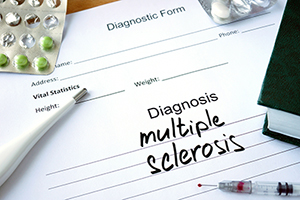In a recent podcast, I made the case for natural treatment of multiple sclerosis with diet, supplements, and other innovative therapies. My experience while treating MS patients for over thirty years has convinced me that while drugs have limited benefits (and many carry with them serious side effects), natural therapies have a dramatic impact on the course of MS.
Before we get to supplements, let’s talk diet. MS is actually the subject of the longest clinical trial of a dietary intervention to treat a medical condition. Beginning in 1949, Dr. Roy Swank treated a group of MS patients with a modified low-fat diet. Whole milk, cheese, butter, margarine and all sources of trans-fats were prohibited. The diet was supplemented with one tablespoon of cod liver oil per day, and participants were encouraged to consume fish three times per week.
After 34 years of follow-up—unprecedented in nutritional science—there were dramatic reductions in disability compared to a control group on an indiscriminate diet. Fifteen patients adhered to the diet for 50 years; thirteen remained active and free of limitations, while only two needed assistance to walk.
But recently, a new paradigm has been embraced to combat MS—the Paleo Diet, best exemplified by the Wahls Protocol. Recently, we had the opportunity to interview Dr. Terry Wahls, herself a testament to the diet’s efficacy. Virtually crippled with MS and relegated to a wheelchair after several ineffective rounds of powerful immunosuppressant drugs, Wahls found her way to recovery by means of rigorous adherence to a version of the Paleo Diet that eliminates “modern” foods.
She recently obtained a seven-figure grant to undertake a comparative study of the Swank Diet vs. the Wahls Protocol for MS patients at the University of Iowa. My personal preference is for the Paleo Diet that I’ve been using with good results for many years with my MS patients.
When it comes to supplements, here are the ones with the most scientific mojo:
1) Vitamin D: Studies show that MS cases cluster at extreme northern and southern latitudes. This led to speculation that sunlight conferred protection against autoimmunity. In fact, several studies have now confirmed the promise of high-dose vitamin D in MS. 10,000 IU per day seems safe for most people, but those considering higher doses should do so under the supervision of a health practitioner.
2) Omega 3 fatty acids: There’s strong scientific rationale for neuro-protection by EPA and, especially, DHA. The success of the Swank Diet might be due, at least in part, to swapping out “bad” hydrogenated fats for healthy omega 3’s from cod liver oil (rich in D, too) and fish. Yet, surprisingly, studies don’t bear out the efficacy of fish oil supplements for MS. But proponents of Omega 3s argue the research was of too short a duration, may have used too little fish oil, or may have involved patients too far gone in MS progression to see any difference. I continue to be a believer in high-dose fish oil for my MS patients.
3) Alpha lipoic acid: Free radical damage may be at the heart of MS; antioxidants are said to shield myelin from attack. Alpha lipoic acid is a premier antioxidant that has been shown to cross the blood-brain barrier. Fifty-four patients were given 600 mg of alpha lipoic acid twice daily for two years. A significant reduction in brain atrophy was noted (P < .004), with a trend toward increased walking speed and a decrease in the number of falls.
4) Pycnogenol: Another star player in the antioxidant constellation is pycnogenol, a potent extract of pine bark, rich in proanthocyanidins. In lab experiments, but not yet in human trials with MS patients, pycnogenol has demonstrated a profound anti-inflammatory effect.
5) Glutathione: The premier antioxidant in the brain, glutathione supplementation has the potential to slow brain deterioration. Since oral glutathione may be poorly absorbed, I suggest using its precursor, N-acetylcysteine (NAC) 500 mg twice or three times daily. Additionally, a new innovative probiotic product, Reg’Activ, has the ability to generate glutathione within the body.
6) Sulforaphane: Known for its anti-cancer effects, sulforaphane has been shown to be powerfully neuro-protective. Its benefits may be ascribed to its ability to activate the nrf2 pathway.
7) Curcumin: A derivative of the curry spice turmeric, curcumin is known as a potent anti-inflammatory. A recent study confirmed effectiveness of curcumin in an animal model of MS.
8) Biotin: Known for its role in supporting nail, skin and hair health, biotin is now being investigated as a potential drug for the most resistant form of MS—progressive MS. But the dosage used is far higher than available in conventional supplements—300 milligrams per day and more. When used at these levels, biotin requires physician supervision, because high blood levels can lead to misleading blood test results.
9) CoQ10: Since mitochondrial energy deficits may underlie neurological impairments in MS, CoEnzyme Q10 is a logical candidate for MS support. A recent double-blind placebo controlled trial examined the effect of high-dose CoQ10 (500 mg per day) on fatigue and depression in MS patients. After 12 weeks, significant improvements were seen. Theoretically, a similar benefit might be achieved with a lower dose of Ubiquinol, which is said to be 2-3 times as potent as CoQ10.
10) Vitamin B3/Nicotinamide Riboside: Another pathway that supports energy production in the brain is via NAD (nicotinamide adenine dinucleotide). Thus vitamin B3—nicotinamide—is essential for mitochondrial function. The authors of a recent review theorize that an even more “body-ready” precursor of NAD, nicotinamide riboside, may be even more helpful than ordinary vitamin B3: “Thus we may expect therapeutic benefits from nicotinamide riboside administration in both MS models.” I recommend Tru Niagen Pro 300 mg twice daily for MS.
11) Carnitine/Acetyl-L-Carnitine (ALC): It stands to reason that that carnitine might be helpful for boosting energy in MS patients. But while some studies show benefits, especially for ALC, others do not. If you try it, I recommend 2 gms of L-carnitine or ALC daily.
12) L-threonine: Spasticity is a common problem in MS patients, causing pain and disability, necessitating the use of drugs that are at best only partially effective. L-threonine has been shown in some studies to have the ability to cross the blood-brain barrier, producing moderate improvements in spasticity in patients with MS. I recommend magnesium threonate (Protosorb Magnesium) which combines the benefits of threonine and magnesium to alleviate muscle spasm.
13) Moducare: The potential of plant sterols (sterinols) for combatting inflammation and autoimmunity has been investigated. Moducare is a product I use for MS at a dosage of 1 capsule twice daily away from food.
14) Probiotics: According to mounting research evidence, a distinct gut-brain connection is at the root of many neurological disorders from autism to Alzheimer’s Disease. A recent study indeed confirms that probiotic administration can ease the symptoms of MS.
15) D-Mannose: Many MS sufferers are susceptible to urinary tract infections due to neurogenic bladder. D-mannose protects the surface of the bladder from attachment by E. coli bacteria. I have found that ½ to 1 tsp daily helps my MS patients fend off cystitis flares.
In a future newsletter article on MS, we’ll tackle the mercury issue, the connection to Lyme and other tick-borne diseases, and the use of low-dose naltrexone, hormones, cannabidiol, and worm therapy!







